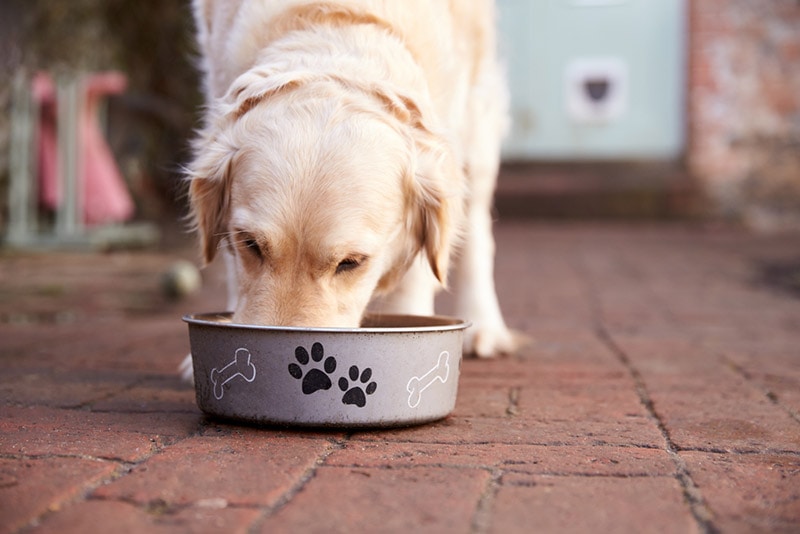Can Dogs Eat Jasmine Rice? Vet-Approved Facts & FAQ
By Beth Crane
Updated on

Rice is often prescribed for dogs if they have gastrointestinal problems such as diarrhea. It’s a very common food that’s easy to come by and often inexpensive. Plus, most dogs enjoy it! Jasmine rice is a variant of white rice, and it has longer grains and is very fragrant. Dogs can safely eat jasmine rice in moderation, just like regular rice. As long as the jasmine rice is prepared properly and fed to your dog under the guidance of your veterinarian, it’s okay for them to eat.
What is Jasmine Rice?
Jasmine rice is a long-grain rice mainly cultivated in Thailand and Cambodia. It has a distinct fragrance and sticky texture, making it a staple in many Asian dishes. Jasmine rice is sweet when cooked and is very soft.
There are two varieties of jasmine rice: white and brown. Dogs can eat both kinds, but brown rice is often not as easily digestible. Brown rice still has the bran (or husk), giving it its tan color. The bran is nutritious but makes the rice harder to digest; because of the bran, brown rice isn’t recommended to be fed to dogs with digestive issues.
What Makes Jasmine Rice Different From Normal Rice?
Jasmine rice differs from white rice and has different properties. Jasmine rice is often described as fragrant, thanks to special compounds. It also has a sweeter taste and is much wetter and stickier than white rice. However, apart from these differences, jasmine rice doesn’t differ from the common white rice sold in grocery stores.

Is Jasmine Rice Good for Dogs?
Jasmine rice is non-toxic and has some health benefits. For dogs prescribed rice to help them feel better, jasmine rice can bind up your dog’s poop if they have acute diarrhea.
In addition, white rice is generally very starchy (including jasmine rice), which can help the gastrointestinal tract slow down and absorb excess water.
However, make sure that you don’t feed your dog jasmine rice if they have diarrhea unless you run it by your vet since it isn’t suitable for all dogs. Only white jasmine rice should be used for this purpose, as brown jasmine rice can harm dogs with the runs and may exacerbate the problem!
Jasmine rice is also good for dogs without gastrointestinal issues, and it contains carbohydrates, energy, and many vitamins and minerals. Jasmine rice is a good source of the following:
- Magnesium, which helps control nerve impulses, contributes to muscle and nerve functions and facilitates a healthy immune system.
- Phosphorus works with calcium to promote healthy bones and teeth.
- Iron is used to create red blood cells and transport oxygen around the body.
- B Vitamins help with a wide range of bodily processes, including metabolism, muscle and nerve functions, energy regulation, and cognitive functions.
- Selenium has a powerful antioxidant action and helps regulate healthy thyroid gland functions.
- Manganese helps dogs metabolize energy, creates enzymes, and contributes to bone and cartilage health.

Are There Any Dangers to Giving My Dog Jasmine Rice?
Jasmine rice isn’t toxic or harmful to dogs, but it may not be appropriate in some situations. You should always speak to your vet before introducing new food to your dog; jasmine rice is no exception. In addition, Jasmine rice is not suitable for dogs that are diabetic or overweight, as it has a high glycemic index, which can cause significant changes in blood sugar levels.
How Can I Safely Give My Dog Jasmine Rice?
Jasmine rice should be boiled and cooked plain, with no additives. Some common additives like salt and butter can make your dog sick. Salt in high amounts can cause sodium toxicity in dogs, and too much fat in the diet contributes to obesity. It can result in an upset stomach or even pancreatitis. Jasmine rice cooked plain will be tasty enough for your pup without jeopardizing their health.
It must be said that serving jasmine rice with onions, garlic, or other members of the allium family, can pose a real risk to your dog’s health. Many veterinarians prescribe a bland chicken and rice diet for dogs with upset stomachs.

How Much Jasmine Rice Should I Give My Dog?
If you’re giving your dog Jasmine rice as a treat, limit it to once or twice a week. Treats, in general, should only make up around 10% of your dog’s diet; the remaining 90% should be well-balanced dog food. For unwell dogs, follow your vet’s advice about how much rice your dog should be given.
Portions sizes for jasmine rice should roughly stick to the guidance for any white rice, which is the following:
- Small dogs should be given around 1–3 tablespoons of cooked jasmine rice.
- Medium dogs should be given around ¼ a cup of cooked jasmine rice.
- Large dogs should be given around ⅓ to ½ a cup of cooked jasmine rice.
This amount should be tailored to your dog’s size and weight, and speaking with your vet beforehand can help you decide how much jasmine rice will benefit your dog.

Final Thoughts
Jasmine rice is a rice similar to other starchy white rice. It is commonly used in Asian cuisine and is a fragrant grain that cooks softer than ordinary white rice. Jasmine rice is perfectly safe for your dog to eat, provided they are given it under the guidance of your vet. Jasmine rice is non-toxic and can help dogs recover from gastrointestinal issues, including diarrhea.
Featured Image Credit: Jaded Art, Shutterstock














